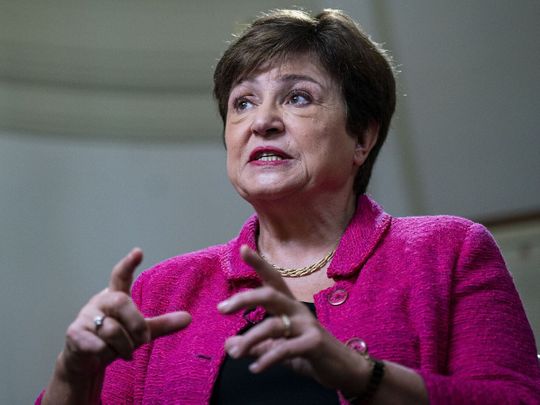Investcorp Remains Active Despite Geopolitical Tensions in the Middle East
Riyadh, Saudi Arabia – In the midst of growing tensions between Israel and Hamas, influential figures in the world of finance gathered for an event to discuss the potential impact of the conflict on neighboring countries such as Egypt, Lebanon, and Jordan. The managing director of the International Monetary Fund (IMF), Kristalina Georgieva, warned that the war could have negative consequences for these countries, particularly in terms of tourism and attracting investors.
Meanwhile, Saudi Arabia’s Finance Minister, Mohammed Al-Jadaan, expressed concern about the risk of economic fragmentation in the Middle East and its wider impact. Highlighting the negative effects of trade restrictions and what he called “friend-shoring,” the minister stressed the importance of collaboration with other countries and international institutions like the IMF to prevent further fragmentation. Al-Jadaan emphasized the need for cooperation, stating that without it, the world could face significant difficulties.
Despite these geopolitical tensions, alternative asset manager Investcorp Holdings remains optimistic about investment opportunities in the Middle East. Hazem Ben-Gacem, co-CEO of the company, described the Middle East as one of the most vibrant and fastest-growing regions for investments, despite its challenges. Ben-Gacem affirmed that Investcorp would continue its focus on sectors like student housing, warehouse and logistics, and multifamily homes, which have consistently provided solid returns to investors.
Furthermore, in a bid to develop Crown Prince Mohammed bin Salman’s flagship megaproject, Saudi Arabia’s Neom is actively seeking foreign investments. Neom recently announced plans to establish a $10 billion venture with Danish freight forwarder DSV A/S. Chief Investment Officer Manar Al Moneef stated that foreign direct investments are a crucial component for Neom’s plans to support the kingdom’s economy and drive innovation.
Overall, despite the complexities and conflicts in the region, influential figures and companies remain optimistic about investment opportunities in the Middle East. Collaboration and foreign direct investments are seen as key drivers of economic growth and development, even in times of geopolitical tensions.

I have over 10 years of experience in the field of cryptocurrency and blockchain technology. I have attended numerous conferences and events around the world, and my work has been featured in major publications such as CoinDesk, Bitcoin Magazine, and Yahoo Finance.

